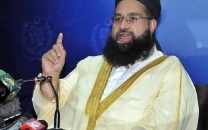Challenging military courts: Centre, provinces asked to respond to LHCBA plea
Supreme Court gives attorney general, advocates general 15 days to file concise replies

Supreme Court gives attorney general, advocates general 15 days to file concise replies. STOCK IMAGE
The Supreme Court on Wednesday gave the federal and provincial governments 15 days to submit concise statements over the passage of the 21st constitutional amendment which cleared the way for setting up military courts to try terror suspects.
Accepting the Lahore High Court Bar Association’s (LHCBA) plea for regular hearing, the three-judge bench headed by Chief Justice of Pakistan (CJP) Nasirul Mulk issued notices to the top law officers of the federal and provincial governments, and the Islamabad administration.
“The petitioner has raised questions of public importance, therefore, notices [will] be issued to the attorney general of Pakistan (AGP) and the advocates general of all four provinces and the Islamabad Capital Territory (ICT),” the bench ruled before adjourning the hearing till February 12.
During the hearing, LHCBA’s counsel Hamid Khan used articles 2A, 8, 9 and 175(3) to build his case against the 21st amendment.
Citing article 175(3) – which separates the judiciary from the executive – Khan argued that the new amendment undermined both the independence of the judiciary and the trichotomy of power. He added that the fresh legislation also infringed upon article 8 which declares laws inconsistent with or in derogation of fundamental rights to be void. The lawyer also contended that the amendment was passed without any debate in Parliament.

A member of the bench, Justice Mushir Alam, however, asked Khan how he would respond if article 239, which prevents any constitutional amendment from being challenged in any court of law, is invoked. The LHCBA counsel replied that he would argue on that point later on.
At one point during the proceedings, Justice Gulzar Ahmad – the third member of the bench – pointed out that Khan took part in the formulation of the 21st amendment bill.
In response, the lawyer said he was part of the legal team asked to give suggestions for expediting the trial of terror suspects and not a member of Parliament. He added that he had also opposed the trial of civilians in military courts and that the 34 parliamentarians of his party, the Pakistan Tehreek-e-Insaf, did not participate in the passage of the bill.
Speaking to reporters after the proceedings, Khan said it would be better if military courts did not start functioning until the top court had issued its judgment on the case.
Senior lawyers, meanwhile, expressed surprise over CJP Mulk’s not opting to form a larger bench to hear the case.
Talking to The Express Tribune, a senior law officer said the federal government is ready to defend the 21st amendment as the public has fully backed the establishment of military courts. Bringing up article 239, he pointed out that all superior court judges are sworn to protect the Constitution. Commenting on references to the Indian supreme court’s move to strike down laws passed by parliament, the officer said the Indian constitution did not have any provision similar to article 239 of the Constitution of Pakistan.
Published in The Express Tribune, January 29th, 2015.



















COMMENTS
Comments are moderated and generally will be posted if they are on-topic and not abusive.
For more information, please see our Comments FAQ